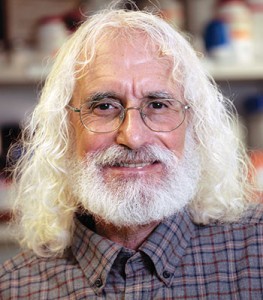Dr. Philip Greenberg, head of immunology at the Fred Hutchinson Cancer Research Center, recently presented his strategies for genetically engineering T-cells to attack and kill cancer cells. His April 20 presentation, made at the 2016 American Association for Cancer Research (AACR) Annual Meeting, was part of a comprehensive symposium that focused on how T-cells can be used to treat cancers, including mesothelioma.
T-cells are white blood cells that are able to attack and remove abnormal cells, including cancer cells, and to also protect against viral infections and toxins. However, T-cells do not always recognize cancer cells as abnormal and target them.

(Photo by Robert Hood/Fred Hutch)
Dr. Greenberg has modified T-cells to more readily distinguish and destroy malignant cells. The strategy can be used, he said, to treat cancers that range from mesothelioma to non-small cell lung cancer, pancreatic cancer, high-grade serous ovarian cancer and leukemia, among others.
According to a news release, the presentation included the current status of a mesothelioma study, in which Dr. Greenberg and colleagues treated three patients with advanced, treatment-resistant mesothelioma with the experimental T-cell therapy. One individual already exhibited substantial reduction of the tumor, and a second has stable disease.
In his presentation, Dr. Greenberg also discussed strategies for improving the therapy, including various methods to enhance anti-tumor activity, like modifying T-cells to specifically attack solid tumors, and using multiple infusions to ensure a more complete cancer treatment.
He believes the therapy’s promise is only beginning to be realized. “This is just the tip of the iceberg,” he said in a press release. “Now we can change T cells to make them function better, make them survive better, make them target the cancer better.”
Dr. Greenberg is also the founder of Juno Therapeutics, and is currently a consultant for the company. Juno was initially formed using technology from researchers at the Hutchinson Center in Seattle, Memorial Sloan Kettering Cancer Center in New York, and the Seattle Children’s Research Institute, with the goal of commercializing new immunotherapies.
Asbestos exposure is the main cause of pleural mesothelioma. It causes tumors of the lung lining, and may affect other organs, including the stomach and heart. Because the one-year survival rate of pleural mesothelioma patients is only 38 percent, new and effective treatments are urgently needed.


